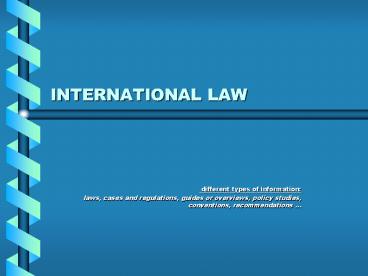INTERNATIONAL LAW - PowerPoint PPT Presentation
1 / 9
Title:
INTERNATIONAL LAW
Description:
INTERNATIONAL LAW different types of information: laws, cases and regulations, guides or overviews, policy studies, conventions, recommendations – PowerPoint PPT presentation
Number of Views:170
Avg rating:3.0/5.0
Title: INTERNATIONAL LAW
1
INTERNATIONAL LAW
- different types of information
- laws, cases and regulations, guides or overviews,
policy studies, conventions, recommendations
2
Definitions
- Foreign law. The domestic law of a country other
than your own. - Comparative law. Study comparing laws of two or
more countries or two or more legal systems
(often includes the study of foreign law). - Public international law.
- Rules dealing with some relations between two ore
more states (i.e., countries). - Rules dealing with some relations between states
and persons (e.g., human rights). - Rules dealing with international organization.
- International economic law is the branch that
deals with economic exchanges between states
(including monetary, trade and customs law).
3
Definitions - II
- Sources of international law
- International convention (treaties)
- International custom, as evidence of a general
practice accepted as law - The general principles of law recognized by
civilized nations - Juridical decisions and teachings of most highly
qualified publicists of the various nations - Private international law (conflict of law)
- Rules dealing with relations among individuals
that have an international element, typically
rules concerning as to which countys laws apply
in a particular dispute.
4
Definitions - III
- Soft law. Guidelines, policy declarations, or
codes of conduct that set standards of conduct
but are not directly enforceable. - Transnational law (the international lex
mercatoria). - Rules governing certain disputes that are
accepted regardless of national jurisdiction. - Promoted as a solution to some problems of
international commercial law contracting parties
from different countries would both be bound by
this transnational law, rather than by law of
either partys country.
5
Sources of analysis
- Preliminary questions
- Is there a convention, are there import cases,
what is a factual background ? - A list of questions include
- factual questions
- questions about the law.
- Sources of international law
- international conventions
- international custom
- the general principles of law
- judicial decisions and teaching
6
Sources analysis - II
- Secondary sources
- Books and law journal articles
- Sources of international law
- Non-legal sources
- News, scientific, technical, economic sources
helping the factual context for legal issue.
Historical work can provide evidence for custom.
7
Sources of law
- United Nations
- Created in 1945 by signing the Charter.
- The UN has six main organs the General Assembly,
Security Council, Economic and Social Council,
Trusteeship Council, Secretariat, and the
International Court of Justice. - The UN system includes independent organization,
called specialized agencies. - European Union
8
Fundamental values of the EU
- The EU as guarantor of peace
- Unity and equality as the recurring theme
- The fundamental freedoms
- The principle of solidarity
- Respect of national identity
- The need for security
- Fundamental rights in the EU
9
Structure of the European Union
- First pillar the European Communities
- EC (customs union and single market, agricultural
policy, structural policy, trade policy) - new or amended provision (EU citizenship,
education and culture, trans-European networks,
consumer protection, health, research and
environment, social policy, asylum policy,
external borders, immigration policy) - Second pillar common foreign and security policy
- foreign policy (cooperation and common position
and measures, peacekeeping, human rights,
democracy, aid to non-member countries) - security policy (disarmament, financial aspects
of defence, security network) - Third pillar cooperation in justice and home
affairs - cooperation between judicial authorities in
civil and criminal law, police cooperation,
combating racism and xenophobia, fighting drugs
and arms trade, fighting organised crime,
fighting terrors, criminal acts against children,
trafficking in human beings































